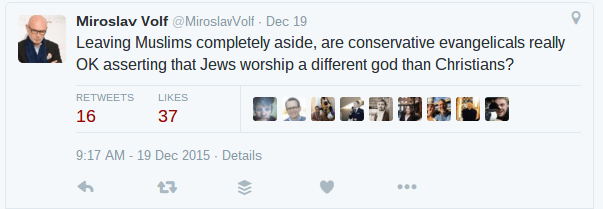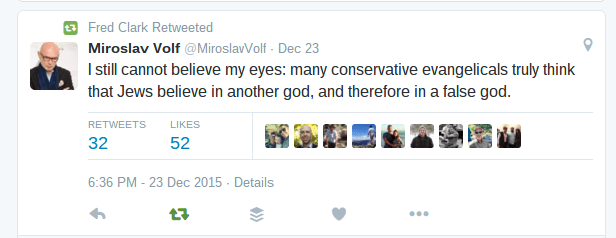Here, again, is theologian Miroslav Volf, talking about the “same God” business that recently bubbled up due to Wheaton College president Philip Ryken’s ongoing efforts to Mohler-ize that school:
All Christians don’t worship the same God, and all Muslims don’t worship the same God. But I think that Muslims and Christians who embrace the normative traditions of their faith refer to the same object, to the same Being, when they pray, when they worship, when they talk about God. The referent is the same. The description of God is partly different.
Volf put this even more succinctly recently on Twitter, writing: “Xians & Muslims disagree about immensely important things about God, but they are disagreeing about *God*, not between gods, so to speak.”
The reason that Volf and other theologians are so emphatic on this point is because it relates to some basic and essential aspects of Christian theology. After all, if Wheaton’s Ryken and other white evangelicals are going to say that Muslims do not worship the same God because they’re not Trinitarian, then we’d also have to say that Jews don’t worship the same God. That would be a patently unorthodox claim that would have vast — and vastly horrifying — theological implications.
Thus we’ve seen many theologians watching this Wheaton debacle unfold work their way through various stages of disbelief. First there’s the incredulous protest:
And then there’s the horrifying realization that, yes, in fact these supposedly “theologically conservative” white evangelicals do indeed want to assert exactly that:
Yep. I can sort of appreciate why Volf and other theologians are surprised by this — the claim that these white evangelicals are making is really, really out there, well beyond the fringes of orthodoxy. And these theologians didn’t expect to hear this from the nominally “conservative” white evangelical community. Those evangelicals have spent more than a century loudly insisting that they are the representatives and defenders of orthodoxy and “conservative” theology, and that loud insistence was largely accepted at face value. If they say they’re theological conservatives, then that’s what they must be, right?
But then you turn around and ask them something very basic about Judaism and the response is a roiling, incoherent stew of very old heresies and unexamined reflexes and something that smells a lot like sheer animus. And then you realize that these self-proclaimed “conservatives” are anything but.
Let’s be clear that it’s extremely unclear what it is that people like Ryken and Al Mohler actually mean when they say that Jews “worship a different God.” Their thoughts seem as poorly articulated as their arguments, so we can’t be sure exactly what variety of weird heterodoxy they’re embracing here. It could be some odd form of monolatrous polytheism. Or maybe old-school supercessionism — or even older-school Marcionism. Maybe it’s just another expression of the “Gentile forgetfulness” of white-Jesus American theology? Or maybe it’s just some garbled window-dressing for plain old anti-Semitism. Or maybe they’ve been reading too much Left Behind.
Or maybe it’s some combination of all those things.
However they got there, and whatever it is they think they mean, this is a Very Bad thing. Nothing good has ever come from Christians asserting that Jews do not worship the same God as they do. This is an ideology that has fueled centuries of oppression, injustice and bloodshed — including the monstrous genocide of the 20th century.
This notion also has far-reaching implications for Christians themselves, including the basic assertion that God is untrustworthy. You can’t sing “Every Promise in the Book Is Mine” while simultaneously teaching that God’s promises to us are based on God’s cheerful breaking of his promises to Abraham. (That makes this, as those evangelicals love to say, a “gospel issue.” If our salvation is based on faith, then the faithlessness of God means our hope of salvation is in vain.)
But, again, it’s difficult to critique whatever it is these “not the same God” folks are asserting because it’s difficult to get a clear grasp of what they mean. I don’t think they quite clearly grasp what they mean themselves.
That’s probably the best that can be said for these “conservative” promoters of heresy at this point — that they haven’t yet really thought this through. This would all be even more disturbing if it seemed like they had.














